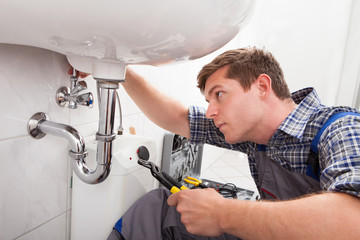Without drains that work correctly, we wouldn’t be able to use our kitchen sinks, toilets, and showers. Many homeowners reach for DIY solutions like baking soda and vinegar or a plunger when they’re clogged.

This natural drain cleaner uses enzymes instead of harsh chemicals to break down buildup and dissolve moderate clogs. It’s also safe for septic systems.
Boiling water can be one of the easiest ways to clear a drain. The high temperature can melt fats and other substances that are often the cause of clogged drains. It can also dislodge and wash away other materials, such as soap scum. For best results, use a pot that holds eight to 12 cups of water. Fill it and carefully pour the hot water down the clogged drain in two to three stages, waiting a minute between each pour.
You can also try boiling a mixture of baking soda and vinegar to dissolve a drain clog. The blog explains that to make this drain cleaner, simply add a half cup of baking soda to the clogged drain followed by a half cup of white vinegar. The reaction between the acid in the vinegar and the alkaline in the baking soda will create a fizzing action that can break down and dislodge clogs. After the fizzing stops, wait 10 to 15 minutes and then run water down the drain to see how well it is working.
If the clog remains, try the salt and boiling water method again. This method works best on grease clogs, as the hot water can melt the fats that are numbing or blocking the pipe. Start by adding a tablespoon of salt to the drain and then pour in the boiling water, slowly and carefully to avoid burning your hands or cracking the porcelain. Then, squirt a little bit of grease-fighting dish soap down the drain to help break down any remaining greasy substances.
Finally, you can try running hot water down the drain to flush it completely. This is a good idea after using any of these drain cleaning methods, as it will clear out any residue and ensure that your drain is working properly. Just be sure to use a pot of water that is large enough to hold several cups at a time, and to wear gloves when pouring the hot water down the drain to avoid burns or other injuries. If the drain is still clogged, you may need to call a plumber to clear it completely.
Baking Soda & Vinegar
Baking soda is a common kitchen ingredient that has a wide range of uses. It can help eliminate odors, freshen drains and cut through grease. This natural cleaner can also clean away soap scum, helping prevent clogged drains and garbage disposals. This homemade remedy is less expensive than store-bought chemical drain cleaners and can be used safely on most plumbing systems.
To use baking soda and vinegar to unclog a drain, first pour a cup of boiling water down the sink to loosen any gunk. Next, pour a cup of baking soda into the drain. The baking soda and vinegar will react, creating a fizzing action that can break down any remaining gunk in the drain or pipes. Allow the mixture to sit and fizz for an hour before flushing the drain with more hot water. Repeat the process as needed to unclog a stubborn drain.
Although it may seem counterintuitive to mix an acid with a base, the reaction between vinegar and baking soda creates water with a small amount of salt that can dissolve fat and grease from the pipes. This method is especially effective if the clogged drain is caused by cooking oil or grease.
Vinegar has a high acid content, which helps break down greasy buildup. The reaction with baking soda can also help eliminate odors. If you regularly pour a cup of baking soda and vinegar down your drains, they can stay clean and free of clogs.
If your drain is still clogged after using baking soda and vinegar, try adding a few drops of grease-fighting dish soap to the mixture. The grease-fighting ingredients in the soap will help dissolve greasy buildup and can even break down some types of clogs, including hair clogs. If you are unable to remove the clog with this method, try using a plunger or drain snake.
Dish Soap
While it may seem counterintuitive, dish soap is actually one of the most effective household cleaners you can use to unclog a drain. Dish soap’s grease-cutting properties help break down food particles and soap scum that accumulate in your drains. Plus, it’s a safe and environmentally friendly option that won’t cause any damage to your pipes or the environment.
Luckily, you already have some of the ingredients you need to make this homemade drain cleaner right in your kitchen pantry! Before you start, remove any visible debris or hair from your sink drain and make sure the water in your sink is dry. Next, mix equal parts baking soda and white vinegar together in a bowl. Pour half of the mixture directly into your clogged drain and let it sit for thirty minutes to an hour. After the baking soda and vinegar mixture has had a chance to work, flush the drain with a pot of boiling water.
If you’re still experiencing a blocked drain, repeat the process until the clog is completely gone. To prevent a clog from reoccurring, be sure to keep hair, grease, oil, and other debris out of your sinks by keeping a drain strainer in your sink and wiping down the area around your sink drain with a damp sponge periodically.
You can even combine this homemade drain cleaner with the baking soda and vinegar method for a double-duty, triple-action DIY solution!
Just like baking soda and vinegar, this combination of household products will fizz and dissolve a clog in your drains. First, make sure your drain is empty by removing the sink strainer and draining out any standing water. Then, squirt a few squirts of dish soap into the drain and wait about 30 seconds before pouring in a pot of hot water. This method is especially effective for fat, oil, and grease clogs, which are common in most homes.
Chemical Cleaners
Chemical drain cleaners are usually liquid products that contain strong chemicals like sulfuric acid, hydrochloric acid and sodium hydroxide. These chemicals help to disintegrate clogs by donating or taking away electrons from the substance that is causing the blockage and by generating heat. They are effective at clearing hair, soap scum and oil build-up in kitchen and bathroom drains. However, they are not suitable for all types of clogs and can do damage to your pipes and plumbing system if used incorrectly. Most of these products must be poured into the drain in a controlled manner according to the instructions on the label. Otherwise, they can react with water and produce toxic fumes that can irritate your eyes and nose as well as cause respiratory issues.
The corrosive chemicals in these liquid products can also be dangerous to your health and should never come into contact with your skin or eyes. If they do come into contact with your body, they can lead to chemical burns and can even damage your internal organs. They are also not safe for the environment as they can poison aquatic life and can contaminate groundwater supplies. In addition, their empty bottles can end up in landfills where they will degrade and release harmful substances into the environment.
Whenever possible, avoid using chemical drain cleaners. Instead, use the techniques mentioned above to unclog your drains or call a plumber for professional assistance. If you have already used chemical drain cleaners, be sure to let the plumber know beforehand so that they can take special precautionary measures when working on your plumbing system. They will also be able to determine the root cause of your clog and recommend the best long-term solution. Moreover, plumbers have the right equipment to safely remove most kinds of clogs without damaging your pipes and plumbing systems. For instance, they can use mechanical tools to clear stubborn clogs that chemical cleaners may not be able to break up or dissolve. This will ensure that your plumbing system works properly and will not need costly repairs in the future.

